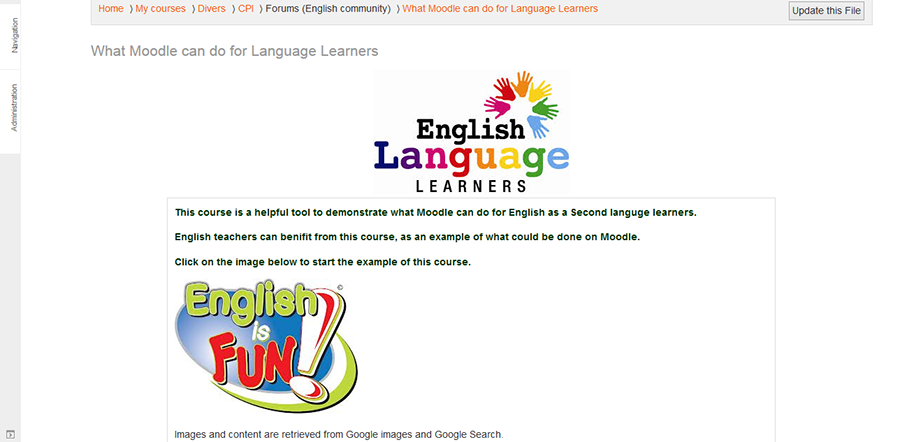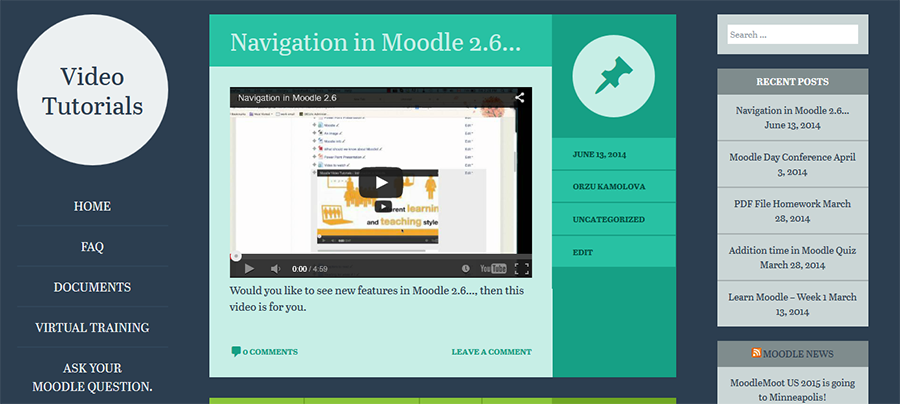Mysterious Moodle: Transforming Teaching and Learning
Let’s be honest. Moving to Moodle is not always an easy proposition. Sometimes I overhear teachers saying that it is not intuitive, that it is a big learning curve. I agree with them. At first sight, this course management system may seem a little daunting. However, the more you work with it, the more you understand that there is a certain logic to the platform that allows you to carefully develop your course.
But let’s take a step back. What exactly is Moodle?
Moodle stands for Modular Object Oriented Dynamic Learning Environment. If we decode this cryptic name, you see that the platform is built from different modules. These modules allow you to exploit them in such a way as to facilitate the transfer of knowledge to your students.
And what exactly is a course management system? Your college probably already has an appointment management system, a student management system, an accounting system and others. Why add another management system? Well, Moodle helps those who hold knowledge to manage their content in a meaningful and pedagogically-sound manner by providing different activity modules based on the constructivist approach. Learners internalize new concepts by discovering things along with their peers. With Moodle, this is accomplished either exclusively in an online virtual environment, or in a blended delivery approach.

Example of an English as a Second Language course in Moodle course
Now that you know what it is, perhaps you are asking why you should use Moodle. Good question! The Internet has become an integral part of our existence and online learning environments are ubiquitous. Could you imagine life after the Internet? Think of all the ways that it has enriched our lives by making information easily accessible when we need it. For several years, many vendors have been creating and optimizing on-line learning environments to make learning as accessible as information on the Internet. As beneficial as these environments can be for students, they are also useful for organizing and facilitating your teaching and evaluation practices.
Moodle has a variety of complementary activity modules to spice up your course like discussion forums, chats, wikis, and workshop activities, just to name few. There are also different educational games and even a webinar plugin that allow you to meet with your students on-line without worrying if a classroom is available.

Moodle’s Webinar Plugin
I could go on and on about Moodle, but instead, I would like to draw your attention to my favourite Moodle module – online quizzes. These teacher’s little helpers make life just a bit easier and take the laboriousness out of grading. With more than 15 question types, Moodle can automate part of the work of grading your students.
Now that you are a little more familiar with Moodle, and have some interesting reasons to try it out, perhaps you are asking yourself who can help you to get started. You’re in luck! The DECclic Corporation has been helping Québec CEGEP teachers for more than a decade with Moodle support, troubleshooting and training in both French and English. There are also Moodle experts at DECclic to help you with any questions you may have. There is also a pretty big community of practice out there, and resources such as a local Moodle website and training sessions tailored to the needs of the English college community. The community is even organizing a Moodle Day on May 15th, with more details to come!

This is a website for the English CEGEP teachers, who use Moodle
The Moodle website www.moodlecegeps.ca is populated with recorded video tutorials and useful information about Moodle’s different activity modules. Check the web site over the next few weeks for more announcements about Moodle Day 2015!
Moodle questions sent through moodlecegeps.ca are guaranteed to receive an answer within 24 hours on business days. There is also a link to the virtual classroom where workshops on Moodle are held. Currently, DECclic is offering a series of Moodle sessions online (in-person sessions can also be arranged upon request).
Here are some of the upcoming on-line sessions for the winter 2015 semester:
- Introduction to Moodle – Adding content to your course
Learn how to navigate and manipulate the content in a Moodle course by adding different file formats and activities.
February 12, at 11:00 – 12:00
February 13, at 13:00 – 14:00 - Rubrics
Learn how to create online rubrics to guide your students on how they will be graded.
February 26, 11:00 – 12:00
February 27, 15:00 – 16:00 - Forums – Encourage your students to share their learning
Social interaction in a forum to share learning is a means to incorporate even your shyest students into the discussion.
March 26, 11:00 – 12:00
March 27, 15:00 – 16:00 - Quizzing your students: Part 1 – How to create a quiz and its category
Creating quizzes requires 4 steps. This workshop deals with the first two.
April 2, 11:00 – 12:00
April 3, 14:00 -15:00 - Quizzing your students: Part 2 – Question bank
The Quiz is perhaps the strongest feature of Moodle. With more than 15 question types, you can easily incorporate interactive quizzes to assess what your students have learned.
April 9, 11:00 – 12:00
April 10, 15:00 – 16:00 - Quizzing your students: Part 3 – Adding questions to your quiz
Almost there! By the end of this session, you will know how to create several question types and make the quiz available to your students.
April 16, 10:00 – 11:00
April 17, 13:00 – 14:00 - Wiki pages – A collaborative tool
The wiki activity module enables students to add and edit a collection of web pages. This session is helpful if you want to engage students by having them collaboratively author an online book, manage a project, or co-create content on a topic you have specified. In addition, collaborative storytelling or the creation of poetry can be handled within a wiki, with each participant writing a line or verse, or using the wiki as a personal journal.
April 23, 11:00 – 12:00
April 24, 13:00 – 14:00 - Real-time quiz – Test the knowledge of your students on the spot
Want to spice up your face-to-face lesson with an online quiz? This session is for you!
May 7, 11:00 – 12:00
May 8, 14:00 – 15:00
To register for an upcoming training session please fill in this simplified form. These sessions will assist you in learning how to create online rubrics, design and develop your content in an interactive way, build question banks for your quizzes and much more!
Happy Moodling everyone!


So much to explore, with Moodle, so little time. What are some of your questions about Moodle?
Great article and much needed! This is an excellent resources for teachers looking to learn Moodle. If I may, I would like to suggest another reason why teachers should use Moodle with ESL students. There is evidence that using Moodle with college-aged ESL students enhances motivation and autonomy. See this research article for details: http://www.scirp.org/Journal/PaperInformation.aspx?PaperID=53555
Hello, also available to all teachers and other professionals in the Quebec’s College Network, is the CDC’s ebook collection on Moodle! Feel free to explore and ask for your free access code! https://www.pinterest.com/cyberthecaire/moodle-cdcs-ebooks-collection-collection-de-livres/
or
visit our Web site: http://cdc.qc.ca/moodle
This article shows how Moodle can meet the needs of teachers.
Great article and resources Orzu! This is ever more important for us to use with our students. Our numbers are continuously growing in Co-op (Concordia University) and we are now beginning to pilot the use of Moodle in making information readily accessible, use as a space to share our professional development webinars, engage with students and creating learning communities, in addition to helping them develop a reflective practice as they develop their competencies.
We are very excited to have access to our amazing Moodle team, Barbara Cree and John Rasso who have been instrumental in getting our initiatives launched. Also a very special thanks to the MA. Education Technology program – I currently have the privilege of working with Stefanie Corona, Instructional Design Intern who really got my ideas of the ground. ID’s are a must and real gem for the workplace.